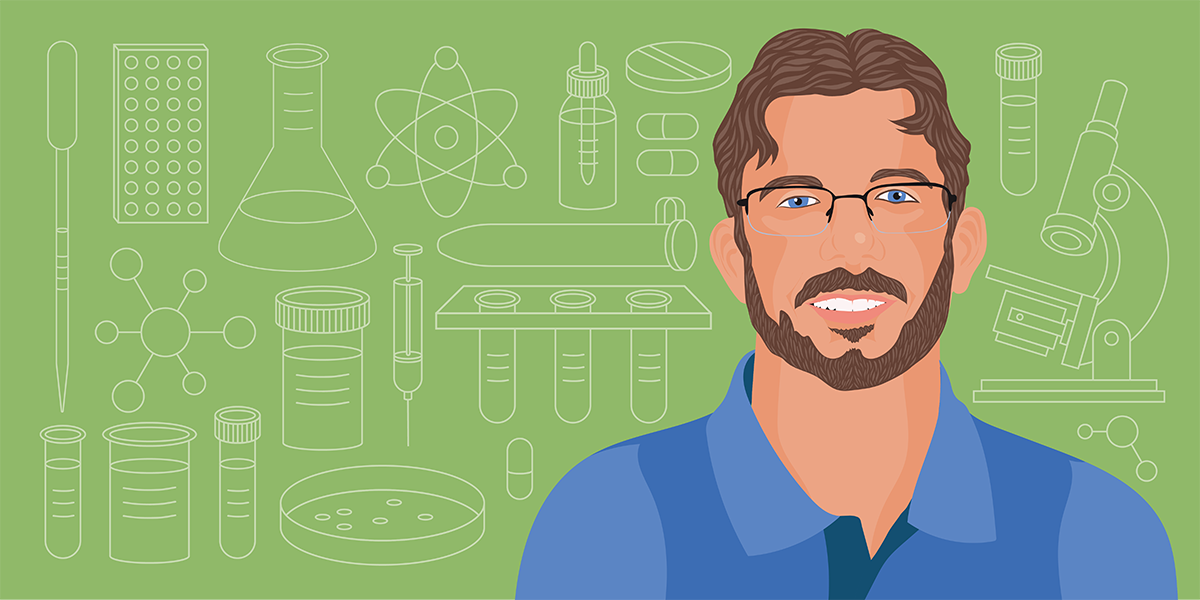Veterinary science for life-saving human and animal outcomes
Aric Frantz, ’14 DVM, ’13 PhD, shares insights on landing a career developing medicine in the private sector

Aric Frantz, ’14 DVM, ’13 PhD, shares insights on landing a career developing medicine in the private sector
In early March, dual-degree alumni Aric Frantz, ’14 DVM, ’13 PhD, spoke with current University of Minnesota College of Veterinary Medicine (CVM) graduate students about how the skills they’re gaining could be applied to a career in industry. Frantz’s official title is North American Science Lead for Immunology and Immunotoxicology at Covance in Madison, Wisc. — a global contract research organization (CRO) that, as part of LabCorp, conducts drug development.
Frantz grew up on a small farm in Northern Illinois, which sparked an early interest in veterinary medicine. “I spent a few years after college doing odd jobs and didn’t start vet school until I was 26 or 27,” he recalls. “I spent three years in an immunology lab at the University of Chicago, but the route back for me was through a medical sales job that I hated. I walked in one day on a Friday and quit on the spot.” Frantz headed straight to a veterinary clinic on the South Side of Chicago and inquired about employment. He was hired during that very visit.
Veterinary school was calling, and Frantz knew the U of M’s dual-degree program was the right fit. He spent 18 months working in Professor Cathy Carlson’s, DVM, PhD, DACVP, laboratory in the Department of Veterinary Clinical Sciences.
“I came to the CVM just for the veterinary program but there was a lot of attention paid to the fact that I had that research background,” says Frantz. When faculty, such as Timothy D. O'Brien, DVM, PhD, Al Beitz, PhD, and Mark Rutherford, MS, PhD, noted the value of his background, Frantz was swayed to consider adding a PhD to his DVM –– which he completed while simultaneously raising three kids.
“The Summer Scholars Program was also really helpful for me because I had done research, and I was adding veterinary experience, but I wasn’t sure how to continue with both,” says Frantz. “Having that program and opportunity to marry the two worlds was awfully useful for me.”
The Summer Scholars Program was also really helpful for me because I had done research, and I was adding veterinary experience, but I wasn’t sure how to continue with both. Having that program and opportunity to marry the two worlds was awfully useful for me.
Aric Frantz, ’14 DVM, ’13 PhD
During his time at the U of M, Frantz did a rotation with Covance lab animal veterinarians but later started at Covance as a study director. Now, in his current role, a big part of what he and his colleagues do is help companies understand what they want, and then take that idea from discovery, through safety evaluation, and into clinical trials
“Many of the ideas for new therapies come from academia and are born into small companies that have no experience in getting through the drug development process; it’s our job in the CRO world to evaluate the efficacy and safety of their drugs, and help them meet regulatory requirements,” says Frantz.
Frantz’s team focuses primarily on the immune system and does so mostly through flow cytometry and immunoassay techniques. His group gets to work on nearly every kind of drug conceivable, including large and small molecules and even cell therapies like CAR-T.
“Any druggable disease under the sun can walk through the door needing support,” says Frantz. Since the recent novel coronavirus outbreak, multiple COVID-19–related projects have entered his labs. Frantz is part of a team that pushes ideas into medications that can be used in both animal and human clinics.
Any druggable disease under the sun can walk through the door needing support.
Aric Frantz, ’14 DVM, ’13 PhD
During his March visit to campus, he told the group of soon-to-be graduates that among the most important qualities he looks for in new hires is the ability to understand how their science fits into the larger solution. “We have a lot of examples everywhere of people doing checkbox science because they don’t really understand the big picture of why they are doing what they are doing,” he says. “There are a lot of DVM/PhD students in industry jobs because companies are looking for people who can understand the big picture, understand medicine, and yet design experiments that fit with key technologies.”
Frantz also shared his best piece of advice for graduates: “Be aggressive about reaching out to your network of alumni and graduates,” he says. “We have people everywhere.”